- Home
- Jane Peart
Fortune's Bride
Fortune's Bride Read online
Fortune’s Bride
Book Three
of the Brides of Montclair Series
JANE PEART
For “Mayme”
In appreciation of years
of love and devotion
None without hope e’er loved….
But love can hope
Where reason should despair.
—Lord Lyttelton
Prologue
Mayfield, Virginia
Summer 1806
What is come upon us: … Our inheritance is turned to strangers, our houses to aliens. We are orphans.
Lamentations 5:1 – 3
THE WHEELS of the handsome black and gold carriage rolled up the winding drive to the large house of mellowed brick, half-hidden by the tall elms surrounding it. Within, a grave young man of twenty-seven and a child of ten rode in silence, each enclosed in private thoughts.
For Graham Montrose, it was a strange homecoming. For Avril Dumont, it was no homecoming at all. Until a few weeks ago her whole life had been spent in a pink stucco house, frosted with white iron lace balconies and shadowed by gnarled oak trees hung with Spanish moss, overlooking the Mississippi River. There she had known nothing but happiness. Now she was experiencing the overwhelming sensations of sadness, loneliness, and anxiety.
Within hours of each other, her parents had died of the dread Yellow Fever that swept through Natchez, leaving virtually no home untouched in its wake. The past weeks had been filled with turmoil and confusion, the servants wandering about without direction, strangers coming and going—a bewildering, frightening time until this kind, quiet man had appeared.
Calmly he had taken charge, explaining that he had been a friend of her papa’s and that she would be coming to live with him at his plantation home in Virginia, where he would take care of her as her parents had wished.
Shyly Avril glanced in the tall man’s direction, but his head was averted. He was staring out the window, apparently lost in a world of his own. Avril wished mightily that Dilly, her black nurse who had accompanied her all the way from Natchez by barge, boat, and stage, were with her right now. Dilly had been sent ahead to Montclair while she and Mr. Montrose stayed overnight in Williamsburg with his Aunt Laura Barnwell. In her entire life Avril had hardly ever been out of her old nurse’s sight and without her the child felt even more lonely and uncertain.
She turned and looked out her window. Since leaving Mayfield, it seemed they had been riding for hours along this narrow road bordered on either side by dense woods. Rounding a bend, she saw a great house with lovely green lawns rolling down to a ribbon of sunlit river.
“We’re almost there,” Graham said, but she gave no response.
He wished there were something he might do or say to bring a smile to the small, freckled face, to soften the impact of her tragedy. He had lost two dear friends, but Avril had been robbed of her parents. Still stunned with shock from the news of Paul and Eva’s sudden deaths, the responsibility as guardian of their only child weighed heavily on Graham.
Their friendship had begun in their school days when, after his own mother’s untimely passing, Graham had been sent to Virginia Preparatory for Boys. Paul, then an upperclassman, had taken the lonely Graham under his wing and had become like an older brother to him. Over the years they had remained close friends—so close, in fact, that when Paul married Eva Duchampes, Graham had stood up with him.
The night before the wedding the two friends had signed a noble pact, agreeing that whoever survived the other’s death would take as his sacred duty the care and protection of his friend’s family. At the time, since both were in the full vigor of young manhood, it had seemed only a gallant gesture unlikely ever to need fulfilling. Now Graham wondered what he, a childless widower himself, was to do with this pathetic orphan, this desolate little girl, alone in the world except for a few distant cousins.
His soul-searching was cut short as the carriage halted in front of the pillared veranda of the house and the carriage door was opened by a smiling black man in a bright blue coat trimmed with braid.
“Welcome home, Mastuh Graham! You’s a sight for dese ol’ eyes!”
‘Thank you, Hector, it’s good to be back.” Bending his tall frame, Graham sprang lightly to the ground. “And this is Miss Avril Dumont, who will also be living at Montclair.” Turning, he extended a hand to the frail child, who made no move to get out.
Hector’s grin widened to a white crescent in his dark face as he nodded. “And welcome to you, little Miss. We has been waitin’ for yo’ comin’!”
Avril smiled tentatively. “Is this Montclair?”
From her vantage point in the carriage, the three stories of the great house rose forebodingly. Then a sliver of late afternoon sun pierced the gloom, striking the polished windows. The reflected rays of light made the glass sparkle like winks of welcome. Suddenly her heart felt lighter.
“Come, dear,” Graham urged.
Dutifully she placed her small, thin hand in his and descended cautiously.
Avril was tall for her age and the hastily purchased mourning clothes, a high-waisted frock of dove gray bombazine, hung limply on her skinny, small-boned body. The black straw “shovel” bonnet with its crepe ribbons almost obscured her face but could not hide the carroty curls escaping in tangled clusters from beneath the wide brim.
Standing there, Avril took a deep breath. The flower-scented air was refreshingly cool after the long, dusty ride along the country roads. She glanced around at the velvety green grass and the gardens where flowers grew in profusion. Beyond the hedges flocks of white sheep grazed in meadows that seemed to stretch forever.
As if realizing some comment was expected of her, Avril murmured, “It’s very pretty here.”
Graham looked down at her and smiled. At length he said gently, “Shall we go in? This is your home now.”
She looked up at him and for a long moment their eyes met and held. In that span of time, a message was sent, trust given and received, an irrevocable bond forged. Avril’s fingers tightened on Graham’s.
Together they mounted the steps and went into the house.
CONTENTS
Cover
Title Page
Prologue: Mayfield, Virginia Summer 1806
Part I: Montclair 1806
chapter 1
chapter 2
chapter 3
chapter 4
chapter 5
Part II: Faith Academy New Hope, North Carolina 1809
chapter 6
chapter 7
chapter 8
Part III: Montclair Spring and Summer 1810
chapter 9
chapter 10
chapter 11
chapter 12
chapter 13
chapter 14
chapter 15
chapter 16
chapter 17
Part IV: Exile 1815-1816
chapter 18
chapter 19
chapter 20
chapter 21
chapter 22
chapter 23
chapter 24
Part V: Homecoming 1816
chapter 25
chapter 26
chapter 27
Part VI: The Waiting Fall 1816
chapter 28
chapter 29
chapter 30
Part VII: Epilogue—Entry from Avril’s Journal Summer 1821
Family Tree In Scotland
The Saga Continues!
About the Author
Copyright
About the Publisher
Share Your Thoughts
Part I
Montclair
1806
The stranger that dwelleth with you shall be unto you as one born among you, and tho
u shalt love him as thyself.
Leviticus 19:34
chapter
1
YEARS AFTERWARD, whenever Avril thought of her first weeks at Montclair she would remember them as a series of impressions—vastness without emptiness, security without confinement, compassion without pity. For now, she knew only that she loved the spacious rooms of the great house, the wide shaded veranda, the smooth lawn where she played under the cool canopy of the elms. Although warm, the Virginia summer had none of the oppressive heat that in Mississippi had forced her to rest in the long afternoons. Avril adjusted with remarkable ease to her new surroundings.
It was Dilly who found it hard to fit in, to become accustomed to the change of climate, the “pecking order” among the Montrose servants, and her puzzling role as nurse-mammy to a child who no longer seemed to need her watchful care.
But for Avril, every day at Montclair offered a delightful discovery. In his inexperience Graham instinctively did the right thing, giving Avril the freedom of the house and grounds, allowing her to wander and explore at will. Thus, she had investigated every inch of the rambling mansion, with its many wings and unexpected twists and turns. She enjoyed moving from step to step on the curved stairway, examining the portraits of the pretty ladies lining the wall. Some of them were dressed in old-fashioned clothing, and Avril often wondered who they were.
‘They are the brides who came to live at Montclair,” Graham told her one day when he found her studying the paintings. Dropping down beside her on the stairs, he pointed to a brunette beauty in crimson velvet trimmed with gilt lace. ‘That was the first bride, Noramary Marsh, my grandmother. And that”—his voice grew soft with emotion—“was my mother, Lorabeth Whitaker. She died when I was just a little boy.” Moving on quickly he pointed to the next painting. “And this was my stepmother, Arden Sherwood.”
Avril looked thoughtful. “Noramary? Is she the one who worked the sampler in the music room?”
“Yes,” Graham smiled. “That’s the one.”
“But your mother is dead?” she added softly.
“Yes … When I was fifteen, my father married a very wonderful woman. They both died shortly afterward—”
Avril’s eyes grew bright. She put her small hand on his, her expression sympathetic. ‘Then you’re an orphan—like me.”
Deeply touched, Graham patted her hand. “Well, but now we have each other, haven’t we?”
Avril’s smile was unexpected, and for the first time, Graham noticed a little dimple at the corner of her mouth. She had not smiled much until now. From that day Graham’s determined goal was Avril’s happiness, to see that dimple dance again.
It was only a week later that Graham called to Avril from the foot of the stairs just as Dilly, hairbrush in hand, was putting the finishing touches to her toilette.
“Avril, come down! I’ve something to show you!”
Pulling away from Dilly’s restraining arm, she rushed from the bedroom, down the hall, and leaned over the banister. Graham was standing in the front hall, with a mysterious smile on his face.
“Hurry!” he urged, motioning her down the steps.
Avril took them at a skip. Covering her eyes with her hands as instructed, she allowed him to lead her onto the porch. There on the drive stood one of the stable boys at the head of a graceful, cinnamon-colored horse with a silky mane and tail.
“Oh-h-h!” Avril let out a long breath.
“Do you like her?” Graham asked.
“She’s beautiful.”
“She’s yours.”
Avril’s eyes widened. “Mine? Really?”
“Really. Her name is Fancy. I’m going to teach you to ride, so you and Fancy will become great friends.”
With the riding lessons came the beginning of a companionship between the man and the child that grew into one of the special pleasures of the life they were making together.
Each morning, with patient thoroughness, Graham instructed Avril in the intricacies of expert horsemanship, treating her with the same consideration and courtesy he might have accorded a grown lady. And Avril responded with an earnest desire to please him and to become an excellent rider.
These she accomplished in record time. Soon they were taking daily rides along the woodland paths and up into the nearby pine-studded hills.
By fall Avril was riding well and had entered into life at Montclair with alacrity. She loved everything about her new home. Above all, she had come to love Graham with the affection of a young girl for a father-brother-and-best-friend, all in one.
Only two incidents marred the lovely flow of her days during the first year. Both were unexpected and never fully explained.
One afternoon, when Avril was out in the side yard, pushing herself back and forth on the swing Graham had hung for her from one of the branches of an enormous oak tree, she saw a strange carriage coming up the drive. She watched as it stopped in front of the house. A slightly built man dressed all in black emerged. He stood for a moment, surveying his surroundings. Then he spoke to the driver, who was slumped in his seat atop the carriage, and turned to mount the steps leading to the porch.
Curious because Graham had said nothing about expecting a visitor and because the man was a stranger to her, Avril let the swing die down, then went inside. As she stepped into the hall, she heard angry voices coming from behind the closed doors of the library.
The thought of Graham’s wrath both startled and frightened her. She had never heard him raise his voice, not even when correcting a stable boy.
Alarmed, she turned and fled outside to the sanctuary of the lilac bushes, where she remained until the sound of booted feet stomping down the veranda steps assured her that the stranger was leaving. Only then did she allow herself a peek at his hasty departure.
“Back to Mayfield!” he ordered and entered the carriage, slamming the door with a violence that sent Avril ducking back into her hiding place.
At dinner that evening Graham announced, “I must make a business trip, Avril. It will require an absence of several weeks, so I want you to stay with Great-Aunt Laura while I’m away. You remember her, don’t you? She’s a delightful old lady and you’ll be good company for her.”
There was no mention of the mysterious caller, however, and for some reason Avril felt afraid to ask about him or the reason for the angry interchange she had overheard. Somehow, though, she suspected that the conversation was connected with her guardian’s sudden travel plans.
Avril’s stay in Williamsburg was pleasant enough. As promised, Great-Aunt Laura was brimming over with vitality and ideas for entertaining a lonely child. She taught Avril to tat, and to tend the several varieties of flowers and herbs that grew profusely in her gardens. In addition, there were children of friends and neighbors to play with. In spite of all these diversions, Avril was very happy to see Graham again when he returned for her.
“You must come back at Christmas,” insisted Aunt Laura as they were about to leave for Montclair. “Graham, you must bring Avril for the holidays. Williamsburg at Christmas is an experience never to be forgotten, my dear,” she said, kissing Avril on both cheeks. “Sister Sally will be here with her grandchildren, so there will be plenty of young folks and fun.”
But the week before Christmas produced a heavy snowfall followed by plummeting temperatures that glazed the snow-covered roads with a treacherous sheeting of ice.
Thus, Avril’s first Christmas without her parents was spent in the company of Graham and the house servants. And while their solitary celebration was a quiet one, there was an abundance of good food and holiday treats and even several intriguing packages under a beautifully decorated tree.
On Christmas morning, Graham watched anxiously as Avril unwrapped one of his gifts to her—a large porcelain doll dressed in satin and lace.
Upon seeing the guarded expression on her face, however, he instantly regretted his choice.
“Ah, my mistake, Avril. You are too old for dolls, aren’t you
?”
She glanced at him tentatively, but her eyes betrayed her momentary disappointment.
“I should have known. Forgive me.”
“Oh, she’s very pretty, Graham. I will love her always even though I don’t play with dolls anymore.” And to prove it, she clasped the lovely gift to her breast.
“Well, never mind,” he said, handing her two more boxes. “Perhaps these will be more pleasing to a growing young lady.”
In one of the gaily wrapped packages was a white fur muff, lined with satin, with a tasseled cord to go around the neck; in the other, a picture book about horses.
Avril squealed with delight. “Thank you, Graham! This is the happiest Christmas ever!”
“And there shall be many more, Avril,” Graham promised, feeling an unexpected tightness in his throat at the sight of her shining face.
Month followed happy month in the company of Graham and the servants who seemed intent on bringing some joy into the life of the orphaned child. It was precisely because life at Montclair was so peaceful that Avril did not have the slightest premonition that something was about to happen to alter the course of her destiny.
With the summer of 1807 nearly past, fall’s subtle stirring could be felt in the lavender dusks and misty mornings. On one such morning Avril awoke with her usual eagerness to start the day. She hopped out of the high four-poster bed, ran to the window, and looked out.
The day was splendid—the sky, a cloudless sweep of blue as far as she could see; the meadows, gold and white with goldenrod and tufts of Queen Anne’s lace. Autumn in Virginia was by far the nicest time of year, so Graham had said, and Avril had long since ceased to question his wisdom, particularly because he always seemed to be right!
She sincerely hoped he would be able to go riding this morning. The brisk air had sharpened her desire to be outdoors, seated on a sidesaddle atop her beloved Fancy, beside Graham who usually chose a handsome mount named Gallant.

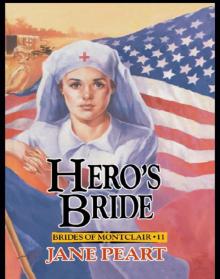 Hero's Bride
Hero's Bride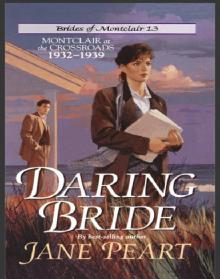 Daring Bride
Daring Bride Runaway Heart
Runaway Heart Promise of the Valley
Promise of the Valley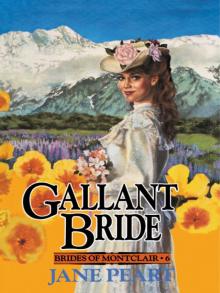 Gallant Bride
Gallant Bride The Pledge, Value
The Pledge, Value Senator's Bride
Senator's Bride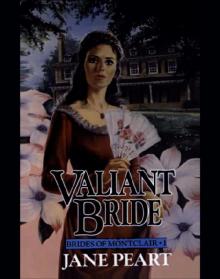 Valiant Bride
Valiant Bride Shadow Bride
Shadow Bride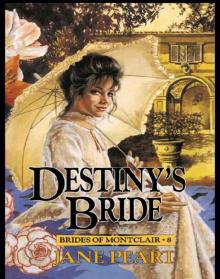 Destiny's Bride
Destiny's Bride A Tangled Web
A Tangled Web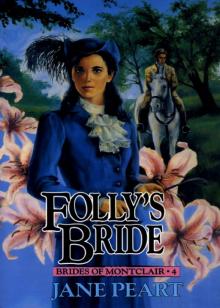 Folly's Bride
Folly's Bride The Promise
The Promise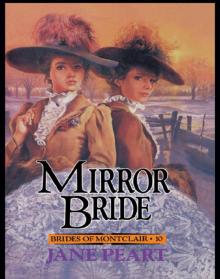 Mirror Bride
Mirror Bride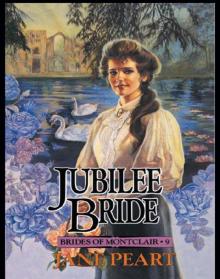 Jubilee Bride
Jubilee Bride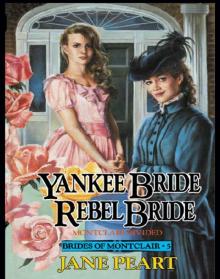 Yankee Bride / Rebel Bride
Yankee Bride / Rebel Bride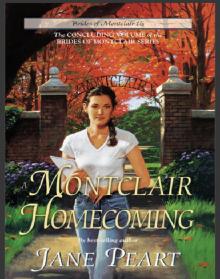 A Montclair Homecoming
A Montclair Homecoming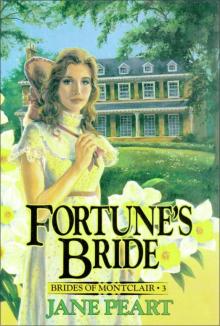 Fortune's Bride
Fortune's Bride Undaunted Spirit
Undaunted Spirit Love Takes Flight
Love Takes Flight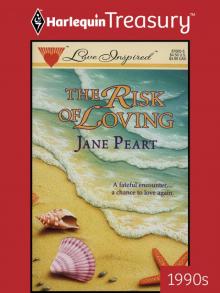 The Risk of Loving
The Risk of Loving The Pattern
The Pattern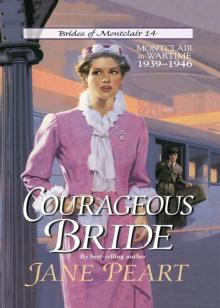 Courageous Bride
Courageous Bride